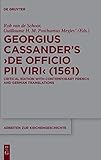Georgius Cassander’s 'De officio pii viri' (1561) : Critical edition with contemporary French and German translations / ed. by Rob van de Schoor, Guillaume H. M. Posthumus Meyjes.
Material type: TextSeries: Arbeiten zur Kirchengeschichte ; 134Publisher: Berlin ; Boston : De Gruyter, [2016]Copyright date: ©2016Description: 1 online resource (X, 296 p.)Content type:
TextSeries: Arbeiten zur Kirchengeschichte ; 134Publisher: Berlin ; Boston : De Gruyter, [2016]Copyright date: ©2016Description: 1 online resource (X, 296 p.)Content type: - 9783110481983
- 9783110485318
- Christian union -- History -- 16th century
- Christian union -- History -- 16th century
- Church history -- 16th century
- Church history -- 16th century
- 16. Jahrhundert
- Humanismus
- Irenik
- Reformation
- Religionsgespräch von Poissy
- RELIGION / Christian Theology / History
- 16th-century irenicism
- colloquy at Poissy
- humanism
- reformation
- 230
- BR355.U5 C37 2016
- online - DeGruyter
- Issued also in print.
| Item type | Current library | Call number | URL | Status | Notes | Barcode | |
|---|---|---|---|---|---|---|---|
 eBook
eBook
|
Biblioteca "Angelicum" Pont. Univ. S.Tommaso d'Aquino Nuvola online | online - DeGruyter (Browse shelf(Opens below)) | Online access | Not for loan (Accesso limitato) | Accesso per gli utenti autorizzati / Access for authorized users | (dgr)9783110485318 |
Browsing Biblioteca "Angelicum" Pont. Univ. S.Tommaso d'Aquino shelves, Shelving location: Nuvola online Close shelf browser (Hides shelf browser)
Frontmatter -- Table Of Contents -- Preface -- Introduction -- Conspectus siglorum -- Abbreviations -- De officio pii viri / Le debvoir de l’homme de bien / Wie sich ein yeder Gottsfürchtiger … halten soll -- On the duty of the pious believer, the true lover of public peace during the present religious disunity within the Church -- The Afterlife of De officio pii viri -- A Closer Examination of some Editions -- Bibliography -- General index
restricted access online access with authorization star
http://purl.org/coar/access_right/c_16ec
The printing history of perhaps the most influential tract in the history of irenicism (church reunification), Georgius Cassander's De officio pii viri, in 1561 presented at the Colloquy at Poissy, together with an overview of its afterlife and the numerous reactions it provoked, both by Protestants and Roman Catholics, will contribute to our understanding of the history of erasmian humanist irenicism. Two contemporary translations, one in German by Georg von Cell and one in French by Jean Hotman, show us how De officio pii viri was adapted to the ongoing struggle for church peace in different parts of Europe, a struggle that was led by jurists and theologians, outstanding members of the Republic of Letters, who were able to spread their ideas by their large epistolary networks. The life story of De officio pii viri highlights the birth, expansion and failure of ideas; how they profit from the support of the mighty and how they fail when opposed by the uncompromising: those who think they speak in the name of God.
Issued also in print.
Mode of access: Internet via World Wide Web.
In English.
Description based on online resource; title from PDF title page (publisher's Web site, viewed 28. Feb 2023)









